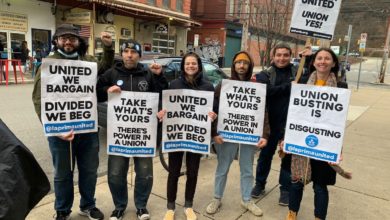On August 18, over 60 attendees gathered at a public town hall both in person and virtually at the Wilkinsburg Boro Building near Pittsburgh, Pennsylvania. Members of the Party for Socialism and Liberation led outreach sessions for weeks leading up to the event, tabling in parks and street corners. The town hall discussion was hosted by the Western PA Coalition for Single Payer Healthcare, Physicians for a National Health Plan and supporters, including the PSL. In attendance were union members, activists, doctors and others working in health care. Council representatives from both Pittsburgh and Wilkinsburg were also in attendance.
The forum was opened by veteran union leader and Western PA Coalition for Single Payer Healthcare Chair Ed Grystar, who spoke to the severity of the current health care crisis caused by private health insurance companies.
Grystar recounted the story of a local nonprofit’s annual pop-up event for free vision, dental and hearing check-ups. Thousands lined up in the street for basic medical care. For Grystar, this was evidence of the twisted cruelty of the for-profit health care system.
“How can thousands of people not have access to the most elementary of services under the shadow of healthcare empires like UPMC?” he asked the crowd. University of Pittsburgh Medical Center, or UPMC, is the largest landowner and employer in Pittsburgh and rakes in megaprofits in the billions every year in spite of being a so-called nonprofit. It also enjoys tax-exempt status. UPMC workers in Pittsburgh have been fighting for their right to unionize, and held mass demonstrations late last year.
Two doctors gave a detailed presentation on the grave economic and social costs of privatized health insurance. “Privatization of health care exacerbates racial inequities in health care by decreasing accessibility to health care, locking people into restrictive networks, and distorting medical decisions toward what is most profitable for CEOs and shareholders rather than what is the best care for patients with complex needs,” said Dr. Cohen of Western Pa Coalition for Single Payer.
The people of the United States spend $4 trillion on health care — nearly twice as much as other countries — yet the health outcomes are some of the worst in the world. Thirty million Americans are either uninsured or underinsured. For many, lack of coverage equals death. Those who are covered are often burdened with crippling debts.
“Medical debt is inflicting grave harm on the working class because of the impact of privatization of all aspects of health care,” said Dr. Judith Albert of Physicians for National Health Plan. This is not an exaggerated claim — a majority of working-class people in the United States are one accident or medical diagnosis away from financial ruin. A 2019 study found that two-thirds of Americans who filed for bankruptcy were doing so for medical issues.
In the context of the COVID-19 pandemic, 14 percent of people polled in the United States said they would avoid treatment for symptoms such as cough and fever, and 9 percent said they would avoid treatment even with suspected COVID-19 infection due to the high cost of health care. In socialist countries, such as Cuba or China with nationalized health care systems, the response to COVID-19 was dramatically different. China, for example, led a massive centralized public health response that even included guaranteeing workers food and shelter.
“Labor negotiations could lead to a more favorable outcome for workers if health care was off the table, since workers are forced to give away so much to retain private health insurance, and wages are further reduced by co-insurance,” said Judith Albert. “Workers must recognize this and hold leaders accountable.” Unions can play a leading role in the fight for single-payer health care. If a single-payer plan was in effect, the bargaining power of unions can be directed to pensions, wages, sick pay and other benefits. Union organizers at the town hall urged militant struggle at the workplace to advocate for Medicare for All, suggesting the familiar three lines of ‘organize, educate, mobilize’ to the attendance. Nearly 650 unions have passed resolutions endorsing H.R. 676, the Expanded & Improved Medicare For All Act.






